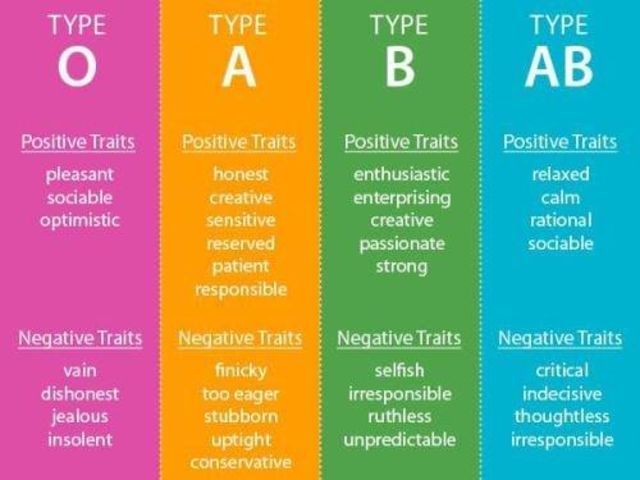Blood Types And Personality Traits: Is There A Connection?

The idea of a connection between blood types and personality traits has been a topic of interest and controversy for many years. This theory originated in Japan in the early 20th century and has since spread to other parts of the world, particularly in East Asia. The belief is that a person’s blood type can determine their personality, temperament, and even their compatibility with others.
Despite the popularity of this theory in certain cultures, the scientific basis for it remains contentious and has been a subject of ongoing debate.
This article aims to examine the relationship between blood types and personality traits from a scientific perspective, exploring the evidence that supports and refutes this theory. We will delve into the characteristics and personality traits associated with each blood type, including type A, B, AB, and O.
Additionally, we will investigate the cultural and historical significance of this theory and how it has evolved over time. By exploring this topic, we hope to provide a balanced and objective analysis of the connection between blood types and personality traits, shedding light on the facts and myths surrounding this popular belief.
Key Takeaways
- The blood type personality theory originated in Japan in the early 20th century and suggests that blood type can determine personality, temperament, and compatibility, but the scientific basis remains contentious and debated.
- Blood typing has gained popularity in Japan for character analysis and matchmaking in interpersonal relationships due to the lack of traditional personality tests, making it unique and accessible.
- There are four blood types, each associated with specific personality traits, but no empirical research supports the association of blood types with personality, and studies have found no consistent and reliable links between blood type and personality.
- Personality development is a complex interplay between genetics and environmental factors, with genetics accounting for 40-50% of individual differences in personality traits and environmental factors accounting for 50-60%.
The History and Cultural Significance of Blood Type Personality Theory
The historical and cultural background of blood type personality theory traces back to early 20th century Japan, where it gained popularity as a means of character analysis and matchmaking in interpersonal relationships.
The idea that blood types could influence personality traits and compatibility emerged from the work of Japanese psychologist Takeji Furukawa, who published a paper in 1927 linking blood types to various personality characteristics.
Furukawa’s theory gained traction in Japan and soon became a cultural phenomenon, with people using blood types as a way to understand themselves and others.
The popularity of blood type personality theory in Japan has been attributed to a few different factors. One is the lack of traditional personality tests in Japanese culture, which made blood typing a unique and accessible way to analyze character.
Additionally, the idea of blood type as a determining factor in personality traits resonated with certain cultural beliefs about individualism and collectivism.
While blood type personality theory has since spread to other parts of the world, it remains most closely associated with Japanese culture and continues to be a subject of fascination and debate.
Examining the Scientific Basis for the Blood Type-Personality Connection
Examining the scientific evidence for a potential correlation between certain physiological characteristics and psychological attributes warrants a thorough investigation. While blood type personality theory has gained popularity in many parts of the world, there is a lack of empirical evidence to support the claims made about the relationship between blood types and personality traits.
Several studies have been conducted in an attempt to validate the theory, but the results have been inconclusive. For example, a study conducted in Japan found that individuals with blood type A were more likely to report anxiety and tension than those with blood type O, but this finding was not replicated in other studies.
Furthermore, some researchers have criticized the methodology of these studies, arguing that they lacked scientific rigor and were influenced by cultural biases. In light of these limitations, it remains uncertain whether there is a genuine connection between blood types and personality traits.
Type A Blood: Characteristics and Personality Traits
Research on individuals with type A blood has suggested a potential correlation between this blood type and certain characteristics and behaviors. According to studies, individuals with type A blood tend to be perfectionists, detail-oriented, and have a strong sense of responsibility. They are also known to be more introverted, anxious, and uptight compared to individuals with other blood types. Additionally, individuals with type A blood are believed to be more susceptible to stress and have a higher risk of developing heart disease.
In terms of their lifestyle, individuals with type A blood are said to thrive on a vegetarian or low-meat diet, as they have lower levels of stomach acid and are prone to digestive issues. They also tend to prefer solitary activities and introspection over socializing. Moreover, individuals with type A blood are said to have a heightened sense of intuition and can be quite creative. However, these traits may also lead to being overly sensitive and easily stressed.
Despite the potential correlation between blood type and personality traits, it is important to note that personality is a complex and multifaceted construct that cannot be reduced to blood type alone.
Type B Blood: Characteristics and Personality Traits
Individuals with type B blood have been found to possess distinct characteristics and personality traits that differ from those with type A blood. According to a study published in the Asian Journal of Psychiatry, individuals with type B blood tend to be more creative, flexible, and optimistic compared to those with type A blood. They are also believed to be more outgoing and social, which makes them excellent team players. Additionally, individuals with type B blood are thought to be better at handling stress and adapting to changes in their environment.
However, individuals with type B blood also have their unique set of negative traits. They are sometimes perceived as selfish and unpredictable, which may lead to conflicts with others. They may also be more impulsive, which can result in making hasty decisions.
Furthermore, people with type B blood are more prone to developing autoimmune diseases, such as multiple sclerosis and lupus, according to a study published in the journal Blood. Overall, while individuals with type B blood may have certain advantages, they also face challenges that should be taken into account.
Type AB Blood: Characteristics and Personality Traits
When considering the unique characteristics and behaviors associated with type AB blood, it is noteworthy that these individuals are often perceived as having a dual nature. People with type AB blood have both A and B antigens on their red blood cells, which means they have inherited traits from both type A and type B blood. This genetic combination often leads to a complex personality that is difficult to categorize.
Type AB individuals are often seen as being rational and sensible, yet also creative and spontaneous. They are known to have strong intuition and empathy, which allows them to connect with people on a deep level. However, they can also be sensitive and easily hurt, which can lead to feelings of loneliness and isolation.
Type AB individuals are also known to be adaptable and flexible, which makes them excellent problem-solvers. They are able to see all sides of a situation and can come up with innovative solutions that others may not have considered. They are also diplomatic and can navigate complex social situations with ease.
However, type AB individuals can also be indecisive and struggle with making decisions, especially when it comes to their own personal lives. They may have trouble committing to relationships or career paths, as they are often torn between different options.
Overall, type AB individuals are complex and multi-faceted, with a unique set of strengths and weaknesses.
Type O Blood: Characteristics and Personality Traits
One notable attribute of type O blood is its strong association with physical health and longevity. Studies have shown that individuals with type O blood have a lower risk of developing cardiovascular diseases, such as heart attacks and strokes, compared to those with other blood types. This may be due to the fact that type O blood is associated with lower levels of a blood-clotting protein known as von Willebrand factor, which can contribute to the formation of blood clots that can lead to these types of health problems.
In addition to its potential health benefits, type O blood has also been associated with certain personality traits. Individuals with type O blood are often described as being strong-willed, confident, and assertive. They are also thought to be more goal-oriented and focused than individuals with other blood types. However, it is important to note that these associations are not necessarily causative and should be interpreted with caution. Further research is needed to fully understand the relationship between blood type and personality traits.
Debunking Common Myths and Stereotypes About Blood Types and Personality
Contrary to popular belief, the idea of blood type having a significant impact on personality is not supported by scientific evidence. While there may be some cultural beliefs and myths about certain blood types being associated with specific personality traits, these are not based on empirical research.
Studies have failed to find any consistent and reliable links between blood type and personality, and any associations that have been reported are weak and inconsistent.
One of the most common myths about blood types and personality is that people with type A blood are more anxious and perfectionistic, while those with type B blood are more outgoing and creative. However, these stereotypes are not supported by research.
In fact, a large-scale study conducted in Japan found no significant differences in personality traits between people with different blood types. Similarly, a meta-analysis of 10 studies that examined the relationship between blood type and personality found no evidence to support the idea that blood type has any meaningful impact on personality.
Understanding the Complex Interplay Between Genetics and Environment in Personality Development
The development of personality is a complex interplay between genetics and environmental factors. While genetics play a significant role in shaping an individual’s personality, environmental factors such as upbringing, social interactions, and life experiences can also influence personality development. Studies have shown that genetic factors account for approximately 40-50% of individual differences in personality traits, with the remaining 50-60% attributed to environmental factors.
Moreover, it is important to note that the relationship between genetics and environment is not a one-way street. Genetics can influence an individual’s response to environmental factors, and the environment can also impact gene expression. For instance, studies have found that individuals with a genetic predisposition to anxiety are more likely to develop anxiety disorders when exposed to stressful life events. On the other hand, individuals with a genetic predisposition to resilience may be better equipped to cope with stress and adversity. In sum, while genetics provide a blueprint for personality development, environmental factors can modify and shape that blueprint in a multitude of ways.
| Genetic Factors | Environmental Factors | |||
|---|---|---|---|---|
| Inherited traits from parents | Upbringing | |||
| Genetic predisposition to certain personality traits | Social interactions | |||
| Gene expression | Life experiences | Epigenetic changes | Exposure to toxins or pollutants |
Conclusion
In conclusion, while the cultural significance of blood type personality theory cannot be denied, the scientific basis for this connection remains inconclusive. Though certain studies have found correlations between blood type and certain personality traits, the evidence is far from conclusive and often contradicted by other studies.
It is important to remember that personality is a complex interplay between genetics and environment, and cannot be reduced to a single factor such as blood type. Therefore, it is important to approach any claims about blood type and personality with a critical and skeptical eye, and to focus instead on evidence-based theories of personality development.









